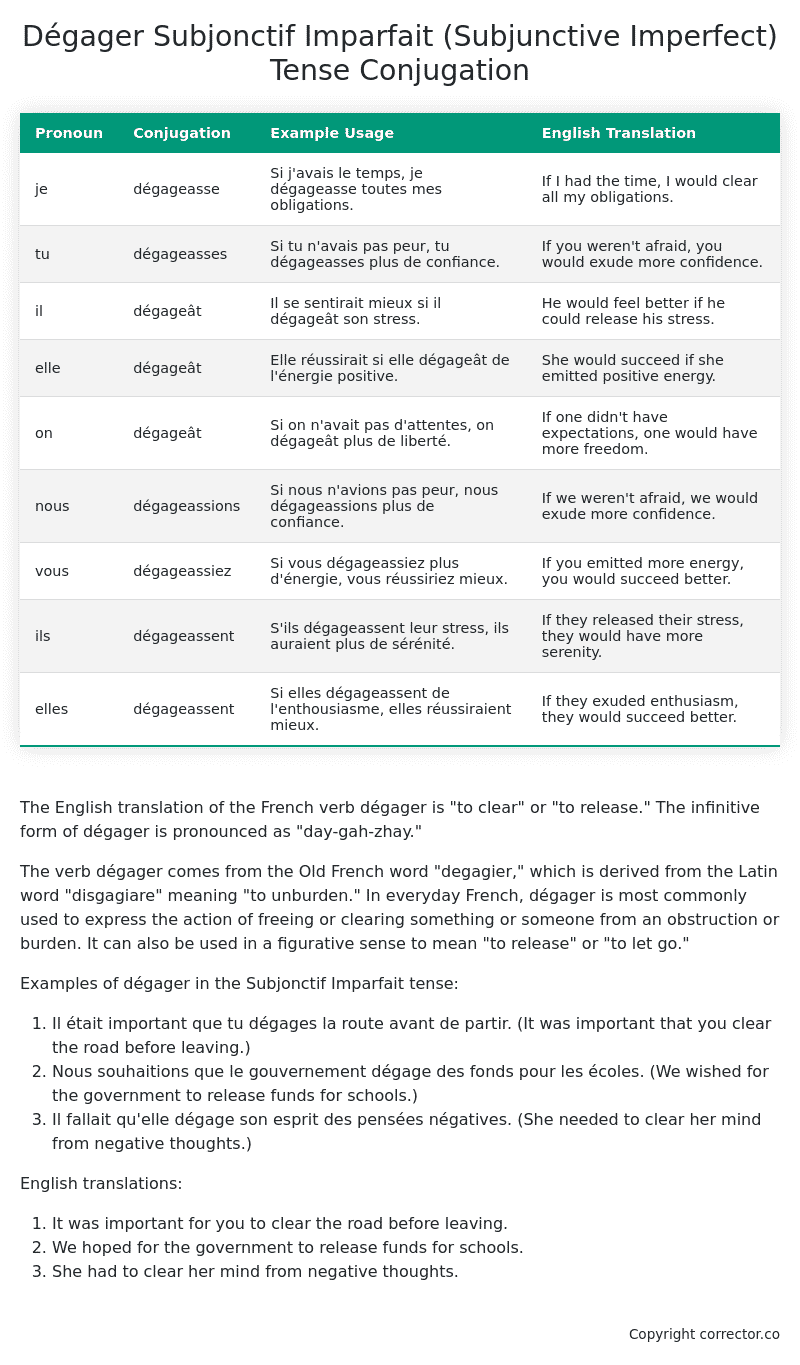Subjonctif Imparfait (Subjunctive Imperfect) Tense Conjugation of the French Verb dégager
Introduction to the verb dégager
The English translation of the French verb dégager is “to clear” or “to release.” The infinitive form of dégager is pronounced as “day-gah-zhay.”
The verb dégager comes from the Old French word “degagier,” which is derived from the Latin word “disgagiare” meaning “to unburden.” In everyday French, dégager is most commonly used to express the action of freeing or clearing something or someone from an obstruction or burden. It can also be used in a figurative sense to mean “to release” or “to let go.”
Examples of dégager in the Subjonctif Imparfait tense:
- Il était important que tu dégages la route avant de partir. (It was important that you clear the road before leaving.)
- Nous souhaitions que le gouvernement dégage des fonds pour les écoles. (We wished for the government to release funds for schools.)
- Il fallait qu’elle dégage son esprit des pensées négatives. (She needed to clear her mind from negative thoughts.)
English translations:
- It was important for you to clear the road before leaving.
- We hoped for the government to release funds for schools.
- She had to clear her mind from negative thoughts.
Table of the Subjonctif Imparfait (Subjunctive Imperfect) Tense Conjugation of dégager
| Pronoun | Conjugation | Example Usage | English Translation |
|---|---|---|---|
| je | dégageasse | Si j’avais le temps, je dégageasse toutes mes obligations. | If I had the time, I would clear all my obligations. |
| tu | dégageasses | Si tu n’avais pas peur, tu dégageasses plus de confiance. | If you weren’t afraid, you would exude more confidence. |
| il | dégageât | Il se sentirait mieux si il dégageât son stress. | He would feel better if he could release his stress. |
| elle | dégageât | Elle réussirait si elle dégageât de l’énergie positive. | She would succeed if she emitted positive energy. |
| on | dégageât | Si on n’avait pas d’attentes, on dégageât plus de liberté. | If one didn’t have expectations, one would have more freedom. |
| nous | dégageassions | Si nous n’avions pas peur, nous dégageassions plus de confiance. | If we weren’t afraid, we would exude more confidence. |
| vous | dégageassiez | Si vous dégageassiez plus d’énergie, vous réussiriez mieux. | If you emitted more energy, you would succeed better. |
| ils | dégageassent | S’ils dégageassent leur stress, ils auraient plus de sérénité. | If they released their stress, they would have more serenity. |
| elles | dégageassent | Si elles dégageassent de l’enthousiasme, elles réussiraient mieux. | If they exuded enthusiasm, they would succeed better. |
Other Conjugations for Dégager.
Le Present (Present Tense) Conjugation of the French Verb dégager
Imparfait (Imperfect) Tense Conjugation of the French Verb dégager
Passé Simple (Simple Past) Tense Conjugation of the French Verb dégager
Passé Composé (Present Perfect) Tense Conjugation of the French Verb dégager
Futur Simple (Simple Future) Tense Conjugation of the French Verb dégager
Futur Proche (Near Future) Tense Conjugation of the French Verb dégager
Plus-que-parfait (Pluperfect) Tense Conjugation of the French Verb dégager
Passé Antérieur (Past Anterior) Tense Conjugation of the French Verb dégager
Futur Antérieur (Future Anterior) Tense Conjugation of the French Verb dégager
Subjonctif Présent (Subjunctive Present) Tense Conjugation of the French Verb dégager
Subjonctif Passé (Subjunctive Past) Tense Conjugation of the French Verb dégager
Subjonctif Imparfait (Subjunctive Imperfect) Tense Conjugation of the French Verb dégager (this article)
Subjonctif Plus-que-parfait (Subjunctive Pluperfect) Tense Conjugation of the French Verb dégager
Conditionnel Présent (Conditional Present) Tense Conjugation of the French Verb dégager
Conditionnel Passé (Conditional Past) Tense Conjugation of the French Verb dégager
L’impératif Présent (Imperative Present) Tense Conjugation of the French Verb dégager
L’infinitif Présent (Infinitive Present) Tense Conjugation of the French Verb dégager
Struggling with French verbs or the language in general? Why not use our free French Grammar Checker – no registration required!
Get a FREE Download Study Sheet of this Conjugation 🔥
Simply right click the image below, click “save image” and get your free reference for the dégager Subjonctif Imparfait tense conjugation!

Dégager – About the French Subjonctif Imparfait (Subjunctive Imperfect) Tense
Formation
Common Everyday Usage Patterns
Interactions with Other Tenses
Subjonctif Présent
Indicatif Passé Composé
Conditional
Conditional Perfect
Summary
I hope you enjoyed this article on the verb dégager. Still in a learning mood? Check out another TOTALLY random French verb conjugation!


